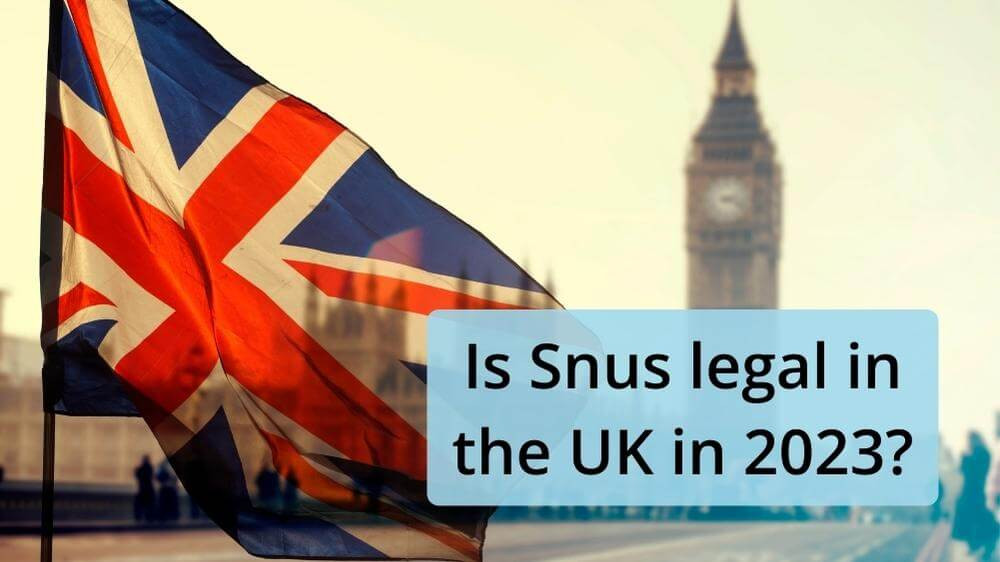Is Snus legal in the UK in 2023?

Snus is a smokeless tobacco product consumed in many countries, including Sweden and America. Many in the UK still inquire regarding the product’s legal standings, with many searching for brands like Siberia Snus. Navigating these regulations surrounding the legalities of snus in the UK can be tricky. This article aims to collate all the relevant information and answer all related questions concerning snus and the UK. Whether that be the governing laws in the EU or future changes in the UK, all is answered below.
What is Snus?
Snus is a smokeless tobacco product consumed across America and Sweden. More importantly, it isn’t the same as nicotine pouches, and many people get this confused. The two different products are compared in the link - Snus Vs Nicotine Pouches, but the main difference is that Snus contains tobacco, and nicotine pouches do not. The tobacco pouch is a product banned in the UK, and those searching for and buying “Snus” are receiving all-white nicotine pouches.
This means that what is often incorrectly referred to as “VELO snus” is actually called “VELO nicotine pouches”.
The same goes for other, all-white, tobacco-free brands like Siberia All-white and Killa. Users may want “Siberia Snus” or “Killa Snus” in the UK. Be aware of this, as you may be thinking you’ve gotten around the rules and regulations and landed yourself a tobacco pouch when, in fact, a nicotine pouch is on its way instead.
Can you buy Snus in the UK?
To keep it short and simple, no. You cannot buy or sell snus (tobacco pouches) in the UK. However, it is legal to use snus if you are over 18 years old. However, nicotine pouches (tobacco-free portions) are legal in the UK, and some users get the two products mixed up.
Why is Snus illegal in the UK?
Before Brexit, the UK was a part of the European Union, meaning the laws put forward by the Union had to be taken on by the UK.
- In 1992, the EU banned Snus as part of the Tobacco Products Directive (TPD).
- This legislation states that “Member States shall prohibit the placing on the market of tobacco for oral use”.
- The TPD categorises “tobacco for oral use” as snus and moist snuff but not chewing tobacco or nasal snuff.
Why was the snus ban introduced in 1992?
In 1983, British American Tobacco and the United States Smokeless Tobacco Company created Skoal Bandits and introduced the American Snus brand to the US. In 1985, the company built a European distribution office. However, their marketing strategies were aggressive and aimed at university students, putting pressure on the government to ban the sale of this product. In 1986, the sale of Skoal Bandits to minors was prohibited, leading to the banning of snus across the EU. *Quoted from the UK Parliamentary Publications.
Is Snus legal in other European countries?
In Sweden, Snus has been used since the early 1800s and is ingrained into the country's culture. Sweden joined the EU in 1995 after EU legislation banned the selling and use of Snus. However, because of Sweden's stand on the matter, they were exempt from this TPD, allowing the use of snus in Sweden. It is the only country exempt from this law.
Will Snus be legal in the UK in the future?
It’s hard to predict whether the legalities around a product like snus will change, especially in the UK, as it is not legal to buy and sell. But there are key points to consider when trying to forecast this:
- Health Considerations and Future Research - if or when future studies highlight a reduced risk of snus compared to other tobacco products like smoking like the research linked.
- Differing Global Perspectives - Studying how snus has affected Sweden and the number of cigarette smokers in the country may change the UK's perspective. Sweden has the lowest amount of cigarette smokers compared to other European countries.
- Policy Revisions - The UK government's priorities may change.
*The points above are purely speculative and hypothetical.
Even with the points above, it's hard to see Snus becoming legal any time soon. A change could have happened shortly after Brexit when the UK reassessed this regulation, but nothing materialised. Therefore, I wouldn’t keep your hopes up!
 In English
In English 



